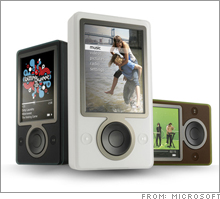Don't cry for the Zune just yetMicrosoft's challenger to the iPod takes second place in digital audio player market in first sales week, according to report.NEW YORK (CNNMoney.com) -- Reports of lackluster sales of Microsoft's Zune that surfaced earlier this week might be a bit premature. Microsoft's newest MP3 player, which launched just over two weeks ago, took second place in the portable digital player market in its first four days of sales, according to numbers generated by the market research firm NPD Group.
"Considering it is a new brand, it's a very good first-week showing," said Ross Rubin, director of industry for NPD Group. Microsoft's (up $0.15 to $29.54, Charts) Zune took 9 percent of digital player sales, according to NPD, edging out Sandisk (down $0.85 to $43.92, Charts), but behind Apple (down $1.09 to $90.72, Charts), whose iPod models have long dominated the MP3 player market. Another research agency, Current Analysis, reported a somewhat similar sales reading during the same week. For the same week ending November 18, 2006, the Zune took 7 percent of the MP3 player market, falling behind both Apple and Sandisk. While the two reports look strictly at sales at major U.S. electronics retailers, online sales of the Zune appear not to be as favorable. As of midday Wednesday, Zune ranked as the 18th most popular MP3 players sold at Amazon.com (down $0.81 to $40.11, Charts), behind most models of the iPod. Shawny Chen, a research analyst for Current Analysis, says that in order to become a serious contender against Apple, Microsoft will have to make further adjustments to the Zune, especially considering the number of unfavorable reviews the device has received so far. "Microsoft will have to come out with an improved Zune that touches on the very features that people are disappointed with this model, such as the limited WiFi capability," said Chen. Kathleen Maher, a senior analyst at Jon Peddie Research, notes that even if the Zune is off to a slow start in the MP3 player market, Microsoft has had a lot of success launching a new product, tweaking it and ultimately satisfying consumers. "It doesn't bug them to dump a bunch of money into an experiment and rejigger it along the way," said Maher, pointing at the success of the Xbox. "It's worked reasonably well." |
|

